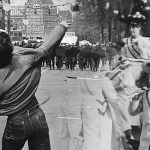 ERC research project Remembering Activism: The Cultural Memory of Protest in Europe; Ann Rigney, Clara Vlessing, and Duygu Erbil (Web)
ERC research project Remembering Activism: The Cultural Memory of Protest in Europe; Ann Rigney, Clara Vlessing, and Duygu Erbil (Web)
Time: 12-14.09.2022
Venue: Utrecht University
Proposals by: 31.01.2022
What can studying life stories tell us about the relationship between memory and activism? Auto/biography studies has long been interested in the ways in which written lives construct subjectivities. Life writing itself has under certain conditions been theorised as a dissenting practice (Perkins 2000; Powell 2021): functioning as testimony in human rights activism (Schaffer and Smith 2004; Whitlock 2007), exemplifying textual forms with which to voice resistance (Harlow 1987; Harlow 1996) or constructing a repertoire of activist identities. Building on these discussions of the socio-political potential of representing lived experience, this conference looks specifically at the storying of contentious lives. How do we remember lived experiences of dissent? And how does life writing, as an act of cultural remembrance, play into the construction of collective identities? Can remembering past activist lives affect contemporary activism?
Bringing together social movement, cultural memory and auto/biography studies, this conference will consider the role of life stories in the memory-activism nexus (Rigney 2018). Auto/biography has a part to play in memory activism (Gutman 2017), in the mobilisation of memory in activism and in mediating the memory of activism: storying contemporary or recent lives saves a particular set of images or version of events for posterity; while the storying of past lives affects the changing memory of protest and protestors, and has the potential to mobilise activists in the present. Focusing on memories of change and the desire to change, it aims to bridge the gap between accounts of remembering selves and remembering collectives in social movements.
Possible lines of enquiry include:
- What can life writing help us understand about the role of cultural memory in social movements?
- How can an individual’s storied life stand for a collective? What are the available subject positions or models for contentious subjectivities?
- What are the media and genres for remembering contentious lives? What literary devices are at work and how do they structure political emotions and affect?
- Which institutions prompt or affect the stories of contentious lives? How does this change over time?
- What forms of witnessing are important to the memory of social movements? Is there an inherent relationship between witnessing and injustice?
- How does the memory of movements relate to the memory of individual lives, which go on longer than particular protest cycles? What role does intergenerational storytelling have in the transmission of contentious memories?
If you are interested in participating, please send a 350-word abstract and short bio to react@uu.nl before January 31st 2022. This is an in-person conference with the possibility of online presentation. A limited number of travel grants will be made available. We intend for this conference to lead to an edited publication in a peer-reviewed venue. Participants will be invited to contribute.
Contact: Clara Vlessing, Duygu Erbil, react@uu.nl
Editorial note: There are two different submission dates on the website. Please check with the organizers if January 31, 2022 or March 1, 2022 are correct.
